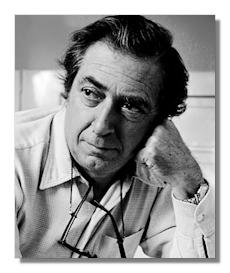
The Internet's Premier Classical Music Source
Related Links
-
Find CDs & Downloads
Amazon - UK - Germany - Canada - France - Japan
ArkivMusic - CD Universe
Find DVDs & Blu-ray
Amazon - UK - Germany - Canada - France - Japan
ArkivMusic-Video Universe
Find Scores & Sheet Music
Sheet Music Plus -
Recommended Links
Site News
Norman Dello Joio

(1913 - 2008)
Born as Nicodemo DeGioio into a family of musicians who emigrated from Italy, Norman Dello Joio (January 24, 1913 - July 24, 2008) began his career at the age of 14 as a church organist. His early training came from his godfather, Pietro Yon, and he later studied mainly with Bernard Wagenaar at Juilliard and Paul Hindemith at Tanglewood and Yale. His music began winning prestigious prizes in the Thirties and Forties, and he was considered in the front rank of younger American composers. In 1957, his Meditations on Ecclesiastes, for string orchestra, won the Pulitzer Prize. He also taught at Sarah Lawrence, Mannes College, and Boston University.
Dello Joio's early music shows Hindemith's influence – harmonies based on fourths rather than thirds, effortless counterpoint, and idiomatic writing for instruments and voices. However, also thanks to Hindemith, he quickly became his own person. Recognizing the young man's facility, Hindemith had advised him to write what he felt, rather than what he thought would be fashionable. Although he kept the concern for craft Hindemith instilled in him, Dello Joio forged a style that mixed Italian operatic lyricism (he's one of the few Modern composers whose music you can hum), Forties jazz, post-impressionist harmonies, and plainchant. You can usually identify Dello Joio's absolutely individual idiom within a few measures. He also is drawn to religious subjects in his stage and choral works.
Dello Joio, like Hindemith, composed extensively for amateurs. The music challenges young players intellectually while remaining performable – a hard thing for a composer to bring off. During the Sixties and Seventies, although he continued to receive commissions, he fell into critical oblivion, like many composers of his generation – including Samuel Barber, Walter Piston, Aaron Copland, Paul Creston, David Diamond, Virgil Thomson, and so on. From appearing on the cover of Musical Quarterly in the Fifties, he went to practically no column inches in that journal. To some extent, this soured him, although he kept it out of his music. However, his work for students and amateurs kept his name alive, and since the Eighties, his music has begun to benefit from a mini-revival. ~ Steve Schwartz

Recommended Recordings
 TBD
TBD
- Recommendation to come…













